Navigating the New Canada Work Permit Wage Requirements for 2024: In a world that’s constantly evolving. It’s imperative to stay ahead of the curve. Especially if you’re planning to work in Canada. The Canada work permit wage landscape is ever-changing, and understanding the wage requirements for 2024 is pivotal for a successful transition. Let’s delve into the specifics of these new wage requirements. It also ensures that you are well-prepared for your Canadian work journey.

The New Wage Requirements
Effective January 1, 2024, Canada will introduce new wage requirements for work permits. These changes come in response to concerns about wage suppression. And these are part of the Minister of Employment and Social Development Canada (ESDC). Randy Boissonnault’s, revisions to the Temporary Foreign Worker (TFW) Program Workforce Solutions Road Map.
The revised ‘Road Map’ aims to more accurately represent the current state of the labor market and future economic outlook. We are making significant changes. And these changes are poised to have a profound impact on both employers and foreign workers.
Annual Wage Reviews
Starting in 2024, employers in Canada will be required to conduct annual wage reviews for their temporary foreign workers. These reviews are essential to ensure that wages are in line with prevailing wage rates for the specific occupation and location in Canada.
This means that companies must pay their temporary foreign workers at the prevailing market rate throughout their employment. Regular wage revisions will be necessary to keep up with the dynamic labor market conditions.
Additional Measures
In addition to the new wage requirements, the Canadian government has announced the extension and implementation of further measures until August 30, 2024. These measures will be reassessed based on forthcoming developments in the labor market and economy. They include:
- Sector-Specific Employment: Employers in specific sectors, such as accommodation and food services, construction, manufacturing of wood products, food manufacturing, lodging and residential care facilities, and construction. They will have permission to employ a maximum of 30% of their foreign workers in low-wage positions.
- Tenure Limit: They will limit the maximum tenure for employment in positions paying less than the median hourly wage in the province or territory to two years.
- LMIA Validity: They will reduce the maximum validity period of the Labor Market Impact Assessment (LMIA). It will be from 18 months to 12 months to align more closely with the job market.
They designed these measures to ensure that the labor market remains balanced and treats temporary foreign workers fairly.
Latest Immigration Articles
- Difference between British Columbia PNP and Alberta PNP (AAIP)?
- 5 Best Provinces to Live in Canada for International Students
- Exploring the options for Canada PNP without a job offer
- Eligibility criteria for Canada PNP without job offer: Complete guide
The Workforce Solutions Road Map
The Workforce Solutions Road Map of the TFW Program serves as a guide for organizations to navigate the current labor market while safeguarding employment and wages in Canada. The goal is to strike a balance between meeting labor demands and protecting the rights and interests of both foreign workers and Canadian citizens.
Monitoring the Market
To ensure that the program is adaptive and in line with changes in the Canadian economy, ESDC will closely monitor the market. The number of files created has notably increased by around 40% in comparison to the previous fiscal year as of October 8, 2023. This reflects a sustained surge in demand for the Temporary Foreign Worker Program (TFWP).
Moreover, the TFWP has made the transition to the LMIA Online Portal as the primary means of submitting Labor Market Impact Assessments, improving processing efficiency, and enabling employers to meet labor market demands more swiftly.
The Recognized Employer Pilot (REP)
The Canadian government has recently introduced the Recognized Employer Pilot (REP). This initiative aims to assist employers who prioritize worker protection while streamlining their operations.
The Canadian government designed the REP program to enhance the protection of temporary foreign workers and reduce administrative burdens for employers with a history of program compliance. It also aims to increase their responsiveness to labor market shortages.
What is the Temporary Foreign Worker Program (TFWP)?
The Temporary Foreign Worker Program (TFWP) in Canada allows employers to hire foreign workers on a temporary basis when qualified Canadians or permanent residents are not available. It plays a crucial role in filling labor shortages in various sectors of the Canadian economy.
How long is the processing time for a Canada work permit?
The processing time for a Canada work permit varies based on factors like the permit type, application location, and season. Recent IRCC data indicates that the Canadian government has processed approximately 80% of online work permit applications in an average of 134 days over the last six months. Keep in mind that these times can change, so monitor updates and apply early.
Contact Us Today
For more information and assistance regarding new Canada work permit wage requirements, please feel free to reach out to us at Angad Immigration. We commit to helping you navigate the evolving landscape of work permits and ensuring full compliance with the latest regulations. Our expert team has prepared themselves well to guide you through a smooth transition in this dynamic environment.


If I will join in canada I want to be international workers at the field of mechanical engineer at the time of moment I leave in Ethiopia and work in ries engineering.